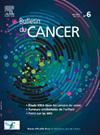[对癌症治疗中心非正式护理人员咨询的评估]。
IF 0.8
4区 医学
Q4 ONCOLOGY
引用次数: 0
摘要
简介:在法国,一些国家战略强调了识别和支持非正式护理人员的重要性。鉴于护理情况对癌症学的重大多方面影响,里昂癌症中心设立了一个咨询机构,专门评估非正式护理人员的需求,并为他们提供支持。当前研究的目的是评估非正式护理人员对这种咨询的吸收情况,并描述其具体特征。方法:采用自填问卷和资料收集表进行资料收集。结果:45例患者的吸收率较高,达96%。他们大多是在咨询中心专业人士的推荐下,或者是在咨询过程中的沟通,主要原因是“与专业人士一起评估自己的情况”。咨询中出现了两种需求,与“心理或精神支持”和“治疗和/或照顾患病亲属的组织信息”有关。为了满足这些需求,大多数非正式护理人员被转介给专业人员(如医生、心理学家)或协会。结论:在健康和护理途径的背景下,对肿瘤学中非正式护理人员的支持是一个真正值得关注的问题,并且在预防方面代表了一个主要的公共卫生问题。这项研究表明,非正式护理人员对专门咨询的依从性很高。它为继续发展这项服务和提供适合非正式照料者需求的支持提供了令人鼓舞的证据。本文章由计算机程序翻译,如有差异,请以英文原文为准。
Évaluation d’une consultation dédiée aux proches aidants dans un centre de lutte contre le cancer
Introduction
En France, plusieurs stratégies nationales évoquent l’importance de repérer et d’accompagner les proches aidants. Étant donné l’impact multidimensionnel majeur de la situation d’aidance en cancérologie, le centre de lutte contre le cancer (CLCC) de Lyon, a implémenté une consultation dédiée à l’évaluation des besoins des proches aidants et à leur accompagnement. La présente étude vise à recueillir l’adhésion des proches aidants à cette consultation et à décrire ses spécificités.
Méthode
Les données ont été recueillies à l’aide d’auto-questionnaires et de formulaires de récolte de données.
Résultats
Le taux d’adhésion des 45 participants est élevé (96 %). Ils sont majoritairement venus sur recommandation des professionnels du centre ou grâce à la communication autour de la consultation, avec pour principal motif de faire « le point sur sa situation avec des professionnels ». Deux besoins sont ressortis de la consultation, liés au « soutien psychologique ou psychiatrique » et à « l’information sur les traitements et/ou l’organisation des soins du proche malade ». Pour répondre à ces besoins, les proches aidants ont été orientés majoritairement vers des professionnels (ex. médecins, psychologues) ou des associations.
Conclusion
L’accompagnement des proches aidants en cancérologie est une réelle préoccupation dans le cadre des parcours de santé et de soins et représente un enjeu de santé publique majeur en termes de prévention. Cette étude révèle une adhésion élevée des proches aidants à une consultation dédiée. Elle fournit des éléments encourageants pour poursuivre son développement et proposer aux proches aidants un accompagnement ajusté à leurs besoins.
Introduction
In France, several national strategies have highlighted the importance of identifying and supporting informal caregivers. Given the major multidimensional impact of the caregiving situation in cancerology, the Cancer Center in Lyon, has set up a consultation dedicated to assessing the needs of informal caregivers and providing them with support. The aim of the current study is to assess the uptake of this consultation by informal caregivers and to describe its specific features.
Method
Data were collected using self-questionnaires and data collection forms.
Results
The 45 participants had a high take-up rate (96%). Most of them came on the recommendation of the center's professionals or thanks to the communication surrounding the consultation, with the main reason being to “take stock of their situation with professionals”. Two needs emerged from the consultation, relating to ‘psychological or psychiatric support’ and ‘information on treatments and/or the organisation of care for their sick relative’. To meet these needs, the majority of informal caregivers were referred to professionals (e.g. doctors, psychologists) or associations.
Conclusion
Support for informal caregivers in cancerology is a real concern in the context of health and care pathways, and represents a major public health issue in terms of prevention. This study shows a high level of adherence among informal caregivers to a dedicated consultation. It provides encouraging evidence for continuing to develop this service and offering support tailored to the needs of informal caregivers.
求助全文
通过发布文献求助,成功后即可免费获取论文全文。
去求助
来源期刊

Bulletin Du Cancer
医学-肿瘤学
CiteScore
1.90
自引率
16.70%
发文量
224
审稿时长
37 days
期刊介绍:
Without doubt, the ''Bulletin du Cancer'' is the French language publication of reference in the field of cancerology. Official organ of the French Society of Cancer, this journal covers all the information available, whether in the form of original articles or review articles, but also clinical cases and letters to the editor, including various disciplines as onco-hematology, solids tumors, medical oncology, pharmacology, epidemiology, biology as well as fundamental research in cancerology. The journal proposes a clinical and therapeutic approach of high scientific standard and regular updates in knowledge are thus made possible. Articles can be submitted in French or English.
 求助内容:
求助内容: 应助结果提醒方式:
应助结果提醒方式:


